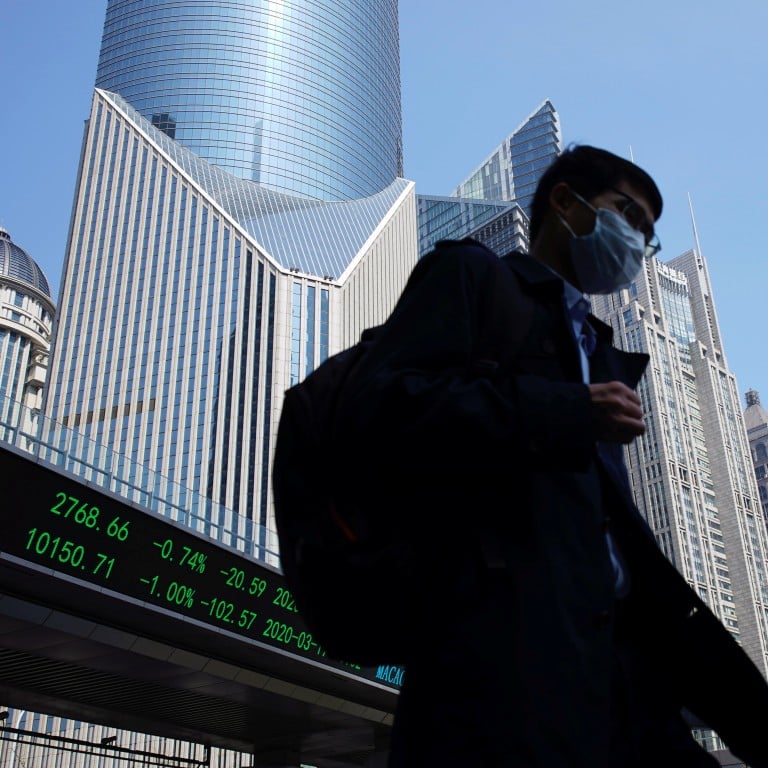
Investors face value trap in chasing China’s stock rebound as first-quarter earnings season kicks off
- The CSI 300 Index has risen 2.7 per cent this month, after completing the worst quarter since 2018
- Corporate earnings seen falling 13 per cent in the first quarter at the height of coronavirus pandemic
The CSI 300 Index, representing the nation’s 300 biggest listed companies on the Shanghai and Shenzhen exchanges, is forecast to report a 13 per cent drop in corporate earnings for the first three months of this year, according to Bloomberg data. Excluding financial firms, the drop may be as steep as 32 per cent, according to GF Securities.
The benchmark has risen 2.7 per cent this month as companies begin to restore factory production and workers return to offices from unprecedented lockdowns. The gauge retreated 10 per cent last quarter, the most since the final quarter of 2018 amid a historic slump in economic activity.
Chinese analyst who made correct call on stocks is cautious as regulator talks up market
“The market has not fully priced in the negative impact of the slide in earnings growth,” said Dai Kang, an analyst at Guangzhou-based GF Securities. “The positive thing for the market is that liquidity is generally adequate and the counter-cyclical policies will be rolled out at a faster pace.”
China requires all listed companies to publish their full-year and first-quarter report cards by April 30. The deadline can be extended by two months for companies affected by pandemic, the China Securities Regulatory Commission said on Tuesday.
Official data pointed to a record decline in economic growth during the January-February period as the coronavirus outbreak first detected in central Hubei province led to lockdowns, crippling manufacturing and consumer spending.
Analysts at Standard Chartered said the “concentrated shock” to China’s economy in the first quarter is likely to be larger than for any single quarter during the global financial crisis in 2007 to 2009. The bank trimmed its GDP growth forecast to 2.5 per cent for 2020, which would make it slowest since a 1.6 per cent contraction in 1976.
Overseas investors dump Chinese stocks worth US$14 billion at fastest pace ever, but analysts say outflow is temporary
Fitch Ratings forecast growth of less than 2 per cent, with the country’s recovery from first-quarter disruption hampered by imminent “deep global recession,” it said in a report on Friday.
The CSI 300 has slipped 9.7 per cent from its peak on March 5. Investors may be encouraged by some early quarterly reports, with 125 companies beating estimates by 0.9 per cent on average. Profit grew 15 per cent in 2019 and 7.5 per cent in 2018.
‘After-the-coronavirus’ stocks at bargain basement prices are screaming ‘buy’
Despite the wild market swings in recent trading, analysts have started calling buys on some stocks or sectors.
Morningstar recommends loading up on “quality companies” with “strong balance sheets,” favouring consumer cyclicals, financial services and real estate developers. Macau gaming operators offer “tremendous opportunities,” equity analyst Chelsey Tam said.
The firm also likes Anta Sports, citing a sales rebound in its clothing stores, while low profitability and market downsides are already reflected in the price of financial stocks, including Industrial & Commercial Bank of China, it added.
China’s fund industry bucks global routs as assets reach new high on haven demand
So far, China’s main stock indexes are the only major market indicators that have not slipped into bear-market territory. Measures to contain the viral outbreak and liquidity injections have helped shore up market sentiment.
While large-cap industry leaders will probably deliver above-average returns once fundamentals stabilise, some may fall into the cracks and disappoint, according to BOC International.
“There will be some downward revision to earnings estimates” as the reporting season progresses, analyst Wang Jun said. “Valuation will be more decided by corporate earnings, rather than liquidity currently.”
Sign up now and get a 10% discount (original price US$400) off the China AI Report 2020 by SCMP Research. Learn about the AI ambitions of Alibaba, Baidu & JD.com through our in-depth case studies, and explore new applications of AI across industries. The report also includes exclusive access to webinars to interact with C-level executives from leading China AI companies (via live Q&A sessions). Offer valid until 31 May 2020.


